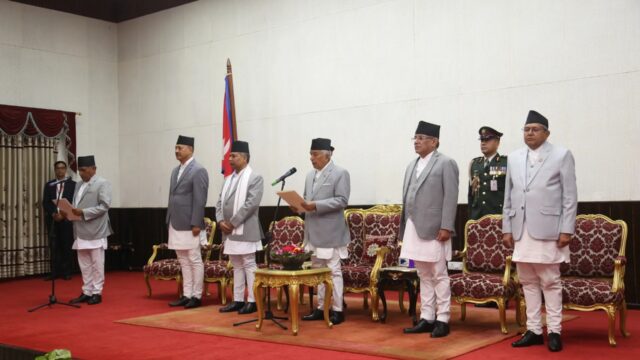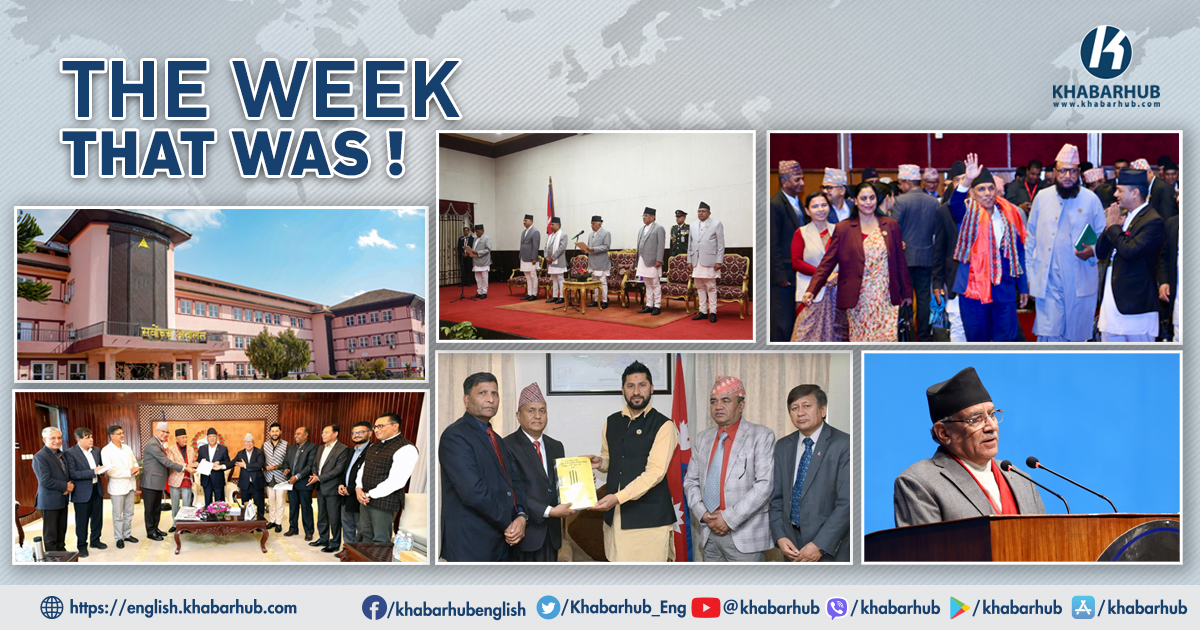KATHMANDU: Last week in Nepal, the political landscape witnessed a series of significant events and developments that captured the attention of the nation.
The events of last week in Nepal encapsulated a spectrum of societal aspirations, political maneuvers, and cultural celebrations, underscoring the nation’s resilience, dynamism, and quest for progress amidst myriad challenges and opportunities.
Prime Minister Pushpa Kamal Dahal, Prachanda and Chairman of the Maoist Center, emerged victorious in a vote of confidence held in parliament.
With the adherence to procedural regulations outlined in the House of Representatives Regulations and the Constitution of Nepal, PM Dahal presented a proposal during the parliamentary session, seeking the confidence of the House in his leadership.
The proposal received support, with 157 votes in favor from a diverse array of parties including the CPN-UML, Rastriya Swatantra Party (RSP), Unified Socialist, and Janata Samajbadi Party (JSP), among others.
This resounding mandate secured by PM Dahal underscored a significant political victory, consolidating his position as the head of the government.
Simultaneously, Nepal witnessed a transition in its legislative leadership as Narayan Prasad Dahal assumed office as the Chairman of the National Assembly.
In a formal ceremony held at Sheetal Niwas, President Ram Chandra Paudel administered the oath of office to Dahal, marking the commencement of his tenure.

This transition came after a closely contested election in the Federal Parliament building in New Baneswor, where Dahal’s victory reflected a shifting landscape of political alliances and dynamics.
Amidst these political maneuvers, the newly formed coalition government embarked on a path of collaboration by establishing a 10-member task force aimed at formulating a common minimum program (CMP) for the government’s operation.
Comprising representatives from various political parties participating in the coalition, the task force convened to deliberate on critical policy matters, reflecting a concerted effort to address the country’s governance challenges through consensus-building and cooperation.
However, amidst the backdrop of political progress, controversies surfaced concerning alleged lapses in the gold smuggling probe.
The Gold Smuggling Probe Commission’s recommendations for disciplinary action against Chief of the Crime Investigation Bureau AIG Kiran Bhajracharya and other officials, as well as legal action against individuals including former Speaker of Parliament Krishna Bahadur Mahara, underscored the challenges facing Nepal’s law enforcement agencies in combating illicit activities.
Furthermore, the upcoming by-election in Ilam-2 added another layer of complexity to Nepal’s political landscape.
Following the untimely demise of Subhash Nembang, the House of Representatives member representing Ilam-2, preparations for the by-election gained momentum.
Aspirants from the CPN-UML began vying for candidacy, with five applicants including Suhang Nembang, the son of the late Subhash Nembang, stepping forward to fill the vacant seat.
Last week unfolded with a tapestry of events that also captured the multifaceted essence of the nation’s socio-political landscape.
Among the highlights was the observance of Gyalpo Lhosar by the Sherpa community across the country.
Celebrated on Falgun Shukla Pratipada according to the Lunar calendar, this auspicious occasion marked the commencement of the year, with Sherpa people commemorating the 2151st Gyalpo Lhosar with traditional fervor.
In the realm of politics, the Rastriya Swatantra Party (RSP) made strategic decisions regarding its participation in upcoming by-elections.
While the party resolved to contest the Ilam-2 by-election scheduled for April 27, it opted out of the electoral fray in the Bajhang constituency of Sudurpashchim Province.
This decision, ratified during a central committee meeting, underscored the party’s calculated approach to electoral engagement, balancing its resources and priorities in line with strategic imperatives.
Meanwhile, the Supreme Court of Nepal issued a directive to the government, mandating the establishment of the Truth and Reconciliation Commission within one month.
This parliamentary deliberation underscored the importance of transparency, accountability, and ethical leadership in Nepal’s democratic governance framework.
This judicial intervention, emanating from a division bench comprising Justices Kumar Regmi and Mahesh Sharma Paudel, underscored the imperative of addressing the grievances of conflict victims in a timely and effective manner.
With the court’s directive emphasizing the need for expeditious action, the government was tasked with implementing measures to ensure the Commission’s operationalization within the stipulated timeframe, underscoring the judiciary’s commitment to upholding accountability and justice.
In a separate development, President Ram Chandra Paudel exercised executive authority by relieving the Province Chiefs of three provinces from their duties.
This decision, grounded in Article 165(1) of the Constitution of Nepal and based on the recommendation of the Council of Ministers, reflected a recalibration of administrative leadership within the provincial apparatus, signaling a renewed phase of governance.
Furthermore, the Nepali Congress (NC) raised ethical concerns in the parliament, demanding the resignation of Deputy Prime Minister and Home Minister Rabi Lamichhane.
Amid allegations of political interference and complicity, the commission’s findings raised pertinent questions about the integrity of governance and the imperatives of accountability.
Asserting the imperative of moral integrity in public office, NC lawmakers called for Lamichhane’s departure, citing lingering doubts surrounding his appointment and ethical lapses.
This parliamentary deliberation underscored the importance of transparency, accountability, and ethical leadership in Nepal’s democratic governance framework.
In the realm of sports, Papua New Guinea (PNG) clinched victory in the Tri-nations T20 International Series, prevailing over Nepal in a thrilling final encounter.
This triumph underscored PNG’s prowess in cricket, showcasing their competitive spirit and skill on the international stage.
Meanwhile, the specter of gold smuggling cast a shadow over Nepal’s law enforcement landscape, with a probe commission submitting its report to Deputy Prime Minister and Home Minister Rabi Lamichhane.
Amid allegations of political interference and complicity, the commission’s findings raised pertinent questions about the integrity of governance and the imperatives of accountability.
Amidst these developments, the Rastriya Prajatantra Party (RPP), Nepal, staged a demonstration in Kathmandu, amplifying calls for systemic reform and the restoration of traditional values.









Comment